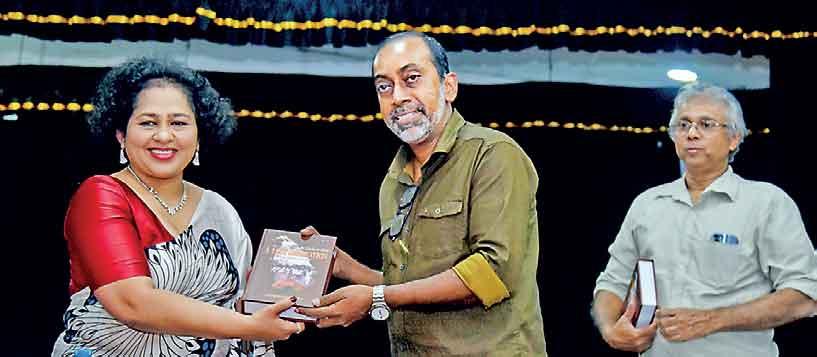Reply To:
Name - Reply Comment

Prins Gunasekara’s daughter, Geshni Gunasekara (left) , is seen officially handing over the book to Minister Hiniduma Sunil Senevi, with Prof. Nirmal Ranjith Dewasiri in the background
Published in 1998, the book offers a harrowing exploration of the haunting and brutal state repression inflicted upon the youth in the 1980s
The decision to relaunch the book was made to commemorate Prins Gunasekara’s birth centenary in 2024
By late 1980s escalating death threats forced Gunasekara and his family to move abroad
The interactions revealed in the book between the author and JVP founder Wijeweera make for an engaging read
He was elected to the 4th Parliament of Sri Lanka, representing the Habaraduwa seat for the Mahajana Eksath Peramuna
in 1960
Prins Gunasekara’s acclaimed work Sri Lanka in Crisis: A Lost Generation was recently relaunched at the Foundation Institute, drawing a distinguished crowd of political activists, literary scholars, and other intellectuals who gathered to celebrate a man who wore many hats as a politician, journalist, lawyer-advocate and human rights activist. While the main stage was reserved for chief guests Hiniduma Sunil Senevi, Harshana Nanayakkara, Prof. Nirmal Ranjith Dewasiri, Warana Ananda Jayakody and Swasthika Arulingam the event was further distinguished by the presence of literary luminaries such as Gunadasa Amarasekara.
The evening began with a welcoming speech by Prins Gunasekara’s daughter, Geshni Gunasekara, who illuminated her father’s commitment to truth. “My father completed writing the book in 1994,” she shared adding, “His intention was to tell the world the atrocities that occurred in his country of birth. Due to the content of the book, many publishers were reluctant to publish it, but finally, Godage publishesrs came forward in 1998.”
‘The Prince of Sri Lankan politics’
Following her speech, Minister Buddhasasana, Religious and Cultural Affairs Hiniduma Sunil Senevi reflected on Gunasekara’s multifaceted life, describing him as ‘the Prince of Sri Lankan politics.’
|
Front cover of the book ‘Sri Lanka in Crisis: The Lost Generation’
|
Born in 1924 in Kathaluwa, Gunasekara became an attorney-at-law in 1955. Before embarking on his political journey he worked as the Chief-Sub Editor of Lankadeepa showcasing his journalistic prowess. He was elected to the 4th Parliament of Sri Lanka, representing the Habaraduwa seat for the Mahajana Eksath Peramuna in 1960. In 1970, parliamentary doors were once again opened to him, this time the scribe turned politician representing the Sri Lanka Freedom Party (SLFP). However in 1971, he left the SLFP following differences of opinion with Prime Minister Sirimavo Bandaranaike. By late 1980s escalating death threats forced Gunasekara and his family to move abroad.
Published in 1998, the book offers a harrowing exploration of the haunting and brutal state repression inflicted upon the youth in the 1980s. It begins with a brief overview of the 1971 period and delves deep into the Satyagraha in 1970s, the contentious 1982 referendum, Black July in 1983, the tenure of President Ranasinghe Premadasa, and the devastating horrors of the 1988–1989 period, the bloodstained memories of which still haunts Sri Lankans. The book also examines how the rulers’ flawed short-sighted decisions paved way for the uprising of Liberation Tigers of Tamil Eelam (LTTE). The interactions revealed in the book between the author and JVP founder Rohana Wijeweera make for an engaging read for those with a hunger for political history in Sri Lanka.
It was shared during the event that the decision to relaunch was made to commomerate Prins Gunasekara’s birth centenary in 2024 following his death in 2018. This second print, published by Kavivara Publishers, includes a preface by Prof. Nirmal Ranjith Dewasiri reflecting on the political trajectory since the book’s original completion. Preparations are underway to have a Sinhala translation of the book to reach a broader audience.
Seizing her moment at the relaunch, Swasthika Arulingam, a Human Rights Lawyer, delved into Prins Gunasekara’s pivotal role in the legal landscape, underscoring his unwavering opposition to the Criminal Justice Commission (CJC) established in 1972 with the aim of prosecuting the alleged perpetrators of the 1971 Insurrection during the tenure of Prime Minister Sirimavo Bandaranaike. “Comrade Prins was known for voicing opposition and dissent against the state. With the establishment of the Criminal Justice Commission (CJC), many of the protections provided by the law for the accused were removed, and the accused who was produced before this court had to prove their innocence. Comrade Prins continuously challenged the legality of the CJC and raised his opposition to how the commission was functioning and eroding the rule of law in Sri Lanka.”
Lionel Bopage, former General Secretary of JVP sent his message from abroad highlighting Gunasekara’s unwavering support for the JVP. He recounted how he allowed his ancestral home to be used for JVP activities and represented the party in the 1983 referendum case.
“Prins continuously advocated for the JVP’s right to engage in democratic politics and exposed the corruption and violence carried out by the state” Bopage said.
Bopage further emphasised the book’s relevance today, “Relaunching this book offers us an opportunity to reflect on an era when youth were sacrificed to safeguard the political and economic benefits of a privileged minority. In his book, Prins referred to the presidents of that era as serial killers driven by a hunger for power.”
The relaunch of Sri Lanka in Crisis: The Lost Generation offers an opportunity for everyone to reflect on blood soaked memories and horrors of a turbulent past. In a nation where people fear violence, it is essential that we learn from the history and ensure that no future generation is consumed by the same darkness.